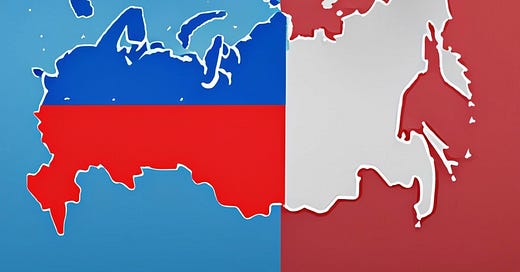Russia's thin red line
President Putin relies on Belarus to help keep Ukraine, because if Russia loses, effectively the Russian Federation will lose its hold on Eurasia to China and the NATO Allies.
Executive Summary: Belarusian President Alexander Lukashenko maintains a close, albeit complex, relationship with Russian President Vladimir Putin. Despite Lukashenko's efforts to assert Belarusian sovereignty, accusations of Russian influence persist, particularly amid economic and political ties. The relationship is crucial for Russia's strategic interests in Eurasia, evidenced by military deployments and nuclear agreements. This dynamic is watched closely by neighboring former Soviet states and opposition groups, impacting regional stability and global geopolitics.
Strategic Alliances: Putin, Lukashenko, and the Eurasian Geopolitical Landscape
There is a strong perception in Belarus, as well as in this region in general, that President Lukashenko and President Putin have a very close relationship. Mr. Lukashenko has a sort of seniority to President Putin. It has to do with their respective ages and roles in the former Soviet regime. Even in conversation President Lukashenko uses the terms Russian/Soviet army interchangeably, noting that Vladimir Putin promised to elevate him to rank of colonel.
President Putin appears to be tempered around President Lukashenko who has a bit of a pit bull personality. Ultimately, President Putin holds the greater power as he was selected to take over after Boris Yeltsin. Hence, President Lukashenko's outbursts to preserve the perception of his presidency and autonomy from Russia in the Belarusian parliament.
As of late, Belarusian President Aleksandr Lukashenko has been making loud and bold statements in the Belarusian parliament. Specifically, Russia does not control Belarus, Belarus is its own country and stands on its own two feet. However, accusations swarm that the Russian Federation controls Minsk, making the Belarusian government abjectly corrupt.
BYPOL, which operates in Poland, is the most vocal Belarusian organization on Belarus' dictatorship and relationship with Russia. BYPOL activists publish audio recordings, images, and names of officials accused of corruption. It is run mostly by former government officials and law enforcement in an effort to gain support to overthrow the current Belarusian government. In effect, ousting Mr. Lukashenko is akin to overturning Moscow’s influence in Belarus.
In 2023, Yevgeny Prigozhin, the former chief of now defunct Wagner Group, organized a coup out of a fit of anger and ordered tanks to head to Moscow. To stop the impending coup, a deal was struck between President Putin, President Lukashenko, and Mr. Prigozhin for the latter to seek haven in Belarus. Evidently, there was more to Yevgeny Prigozhin's employment history and connections than meets the public eye. It seemed for a flash of a moment that somehow he may outlive his personal war with Mr. Putin. But on a trip from Moscow to Saint Petersburg, he died in a mysterious plane crash a few months later. Despite Mr. Lukashenko’s public comments, his country plays a role in Russia’s theater.
The Putin-Lukashenko relationship is tremendously important for Russia's influence in Eurasia. In the fall of 2023, Russia sent tactical nuclear ballistic missiles to Belarus to demonstrate to NATO the lengths Russia will go to keep Ukraine. President Putin also gave Mr. Lukashenko the capability to launch those missiles, breaking post-Cold war proliferation agreements. This strategy helps Russia posture against other former Soviet satellite nations from joining in on the movement towards the EU and NATO.
There are former Soviet governments along Russia's border, as well as opposition forces in some of these countries, that watch Ukraine's bid for independence with bated breath. Every move that Russia makes, they are watching and evaluating. If one of those leader's or opposition groups sees an opportunity to break free from Russia's sphere of influence, they will take it. And, Russia knows it.
In a not too dissimilar fashion, a parallel dynamic occurred during the wars in Chechnya and Georgia. The Russian Federation believes that if it loses one, it will lose them all. In order for Russia to release its hold of Crimea, Lugansk or Donetsk, the arrangement between Ukraine and NATO will need to be rather spectacular.
For the Russian government, losing the war is tantamount to the end of its global power. Russia's influence in the Black Sea region, along with its borders in the Baltics and Asia, are immensely important to its hegemony. If Russia loses the war, it will open the possibility for the Black Sea states and the Caucasus's to converge with the EU and NATO.
In Asia, the Central Asian states will try to keep allyship with the West. However, it will be an economic battle over resources and the Belt and Road Initiative with China. Ultimately, Russia itself likely will become a natural resource at the PRC’s disposal. With all this in mind, the Russian Federation’s current leadership holds on to Belarus for dear life, and prefers to risk state collapse than give in to NATO on Ukraine.
~E
©2024




Excellent, Elizabeth. This, in combination with the prior essay on the subject of culture and religions within the Federation, reminded me of the analysis made by Peter Drucker in his book The New Realities published in 1989. In it, he discussed the built in difficulties of unraveling the Soviet Union within the context of a population that was expected to be, by year 2000, over 50% non-European and of that almost 50% Moslem. Not sure how the demographics played out, but your essays of 2024 are highlighting the cultural and religious fault lines.